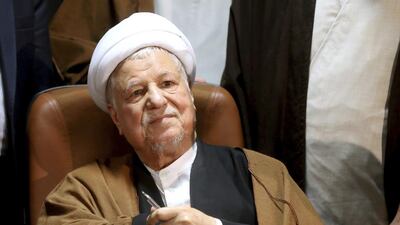Political memories are often short, particularly in countries far away from the Middle East. It has been notable that some of the obituaries of Iran’s former president Ali Akbar Hashemi Rafsanjani have focused on his reputation as a “reformer” – without noting that he acquired that reputation very late in his political career, and only after he had failed to outflank those even more hardline than him.
Rafsanjani had a long and controversial political career. Although much diminished in the past few years, he still remained an important force in Iranian politics. But his reformist credentials are barely a decade old, and then always within the system of the Islamic republic. In his many decades of public life, he never wavered from the system of government he himself helped to usher in in 1979.
It was only after he lost the presidency to Mahmoud Ahmadinejad in 2005 that he began to style himself a reformer. After Mr Ahmadinejad won again in 2009, in an election whose result was bitterly contested, his rival Rafsanjani endorsed the Green Movement that arose against his presidency. It is true that after that he turned his attention to “moderate” issues such as calls for greater political freedom, but that came after a long political career in which concern for those issues were absent.
Rafsanjani was involved in the Iranian revolution from the very beginning, serving as parliamentary speaker and then president; he also served as commander in chief of the armed forces during the Iran-Iraq war. And while he did have some successes – persuading Ayatollah Khomeini to end the war must count as one – he is also accused of serious human rights violations. Rafsanjani is thought to have given the orders for the executions of thousands of political prisoners in the late 1980s, as well as the murder of regime opponents inside Iran.
His record as president was also deeply chequered. In 1989, the United Nations issued a report in which it alleged, as The New York Times reported at the time, that the government of Rafsanjani continued "to violate its citizens' basic human rights ... torturing and executing political enemies".
A full accounting of Rafsanjani’s political career is important to assess his effect on Iranian politics, and to understand why, even today, he is still remembered as a hugely divisive and controversial figure in Iran’s complex political landscape.

